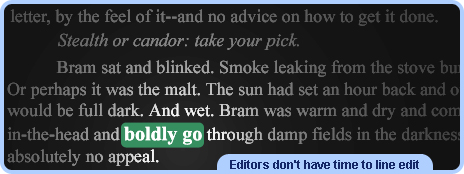Technically Speaking
J.V. Jones
Dec 6th : 2007
|
Technically Speaking
|
|
|
J.V. Jones
|
Dec 6th : 2007
|
|
I attend a couple of writers groups, one of which is for aspiring writers. One of the recurring issues is technical stuff: sentence structure, grammar, word usage, punctuation, etc. My advice is if you’re serious about writing you have to master the technical side. Yes, there are brilliant writers who openly flout rules at every turn (Joyce and Eliot spring to mind) but they are the exceptions. You can tell the greatest story, featuring enough fiendish plot twists to confuse a quorum of cryptologists, but you'll lose an editor in the first paragraph if you fail to dot your Is and cross your Ts.  Learn the difference between “lie” and “lay” and “may” and “might”. Learn the collective noun for trees (stand) and effect (not affect) the appropriate changes. Go boldly, don’t boldly go. Cut off bad grammar at the pass. Don’t cut bad grammar off at the pass. Learn to discriminate between the colon and its half-brother the semi colon; it’s easy once you get the hang of it. Aim to make your writing perfect, not very perfect. The ultimate goal is that each writer should bring his or her (not their) best efforts to the page. By failing to learn correct usage you let yourself down. Grammar and vocabulary are essential tools--not unnecessary restrictions--and by mastering them you build strength, skill and credibility as a writer. |